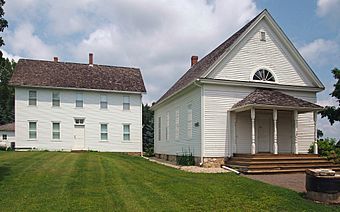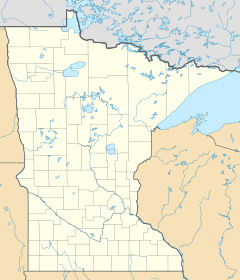Vasa Township, Goodhue County, Minnesota facts for kids
Quick facts for kids
Vasa Township, Minnesota
|
|
|---|---|
|
Township
|
|
| Country | United States |
| State | Minnesota |
| County | Goodhue |
| Area | |
| • Total | 41.2 sq mi (106.6 km2) |
| • Land | 41.0 sq mi (106.1 km2) |
| • Water | 0.2 sq mi (0.5 km2) |
| Elevation | 1,093 ft (333 m) |
| Population
(2000)
|
|
| • Total | 872 |
| • Density | 21.3/sq mi (8.2/km2) |
| Time zone | UTC-6 (Central (CST)) |
| • Summer (DST) | UTC-5 (CDT) |
| ZIP code |
55089
|
| Area code(s) | 651 |
| FIPS code | 27-66640 |
| GNIS feature ID | 0665852 |
Vasa Township is a community located in Goodhue County, Minnesota, in the United States. In the year 2000, about 872 people lived there. A special part of the township is known as the Vasa Historic District. This area is listed on the National Register of Historic Places because it has important historical buildings and sites.
Vasa Township was officially created in 1858. It was named after Gustav I of Sweden (also known as Gustav Vasa), who was a famous king of Sweden. Over time, the township has been called by a few different names, such as Mattson's Settlement, Vasa, and Vasa Village.
Contents
Discovering Vasa Township's Past
In 1853, a person named Hans Mattson was the first European to settle in this area. He later encouraged many families from Sweden to come and live there too. This group of families became known as the Mattson Settlement. Later, the settlement was renamed Vasa. This new name came from the local Swedish church, which chose to honor the Swedish king from the time of the Reformation.
In 1851, the United States government and the Upper Dakota Sioux signed a very important agreement called the Treaty of Traverse des Sioux. This treaty made a large part of what is now western and southern Minnesota, including the Vasa area, into land owned by the U.S. government. Even though many European settlers were already moving into the area, often against the wishes of the Dakota people, this treaty encouraged even more people to come as the U.S. pushed for Westward Expansion.
Between 1854 and 1880, Vasa grew a lot, far beyond the first 10 families. The wider Goodhue County area had more than 4,300 residents. During the 1800s, 19 buildings were built in the center of the village.
Vasa became successful in farming. It was also special because it had a U.S. post office that was part of the first Rural Free Delivery route in Minnesota. This service delivered mail directly to people's homes in the countryside. However, in the 1950s, many of the main businesses in Vasa closed, and the community stopped growing.
Today, the original village site, which includes the church and an orphanage, is part of the Vasa Historic District. It is considered the best-preserved early Swedish settlement in Minnesota. The buildings show the style of architecture from that time. Many Americans with Swedish heritage in Minnesota still look to this area for cultural inspiration.
Exploring the Vasa Historic District
|
Vasa Historic District
|
|

Vasa Museum and Caretaker's House
|
|
| Nearest city | Red Wing, Minnesota |
|---|---|
| Area | 100 acres (40 ha) |
| MPS | Rural Goodhue County MRA (AD) |
| NRHP reference No. | 75000983 |
| Added to NRHP | May 30, 1975 |
A special part of the Vasa community is listed on the National Register of Historic Places. It is called the Vasa Historic District. Vasa was started in 1853 by Swedish immigrant farmers. Even though its population became much smaller in the 1900s, the buildings and land in the district are very well-preserved. When it was nominated for the National Register, it was described as "the most intact" of the first Swedish communities in Minnesota.
The Old Vasa Swedish Lutheran Church was built in 1861. Today, it serves as a museum that shares the local Swedish history. The Vasa Children's Home was first located inside the church. Later, it moved into its own building nearby.
Geography and Location
Vasa Township covers a total area of about 41.2 square miles (106.6 square kilometers). Most of this area, about 41.0 square miles (106.1 square kilometers), is land. The remaining 0.2 square miles (0.5 square kilometers) is water.
Two important roads in the township are State Highway 19 (MN 19) and County 7 Boulevard. These roads help people travel through the area.
People of Vasa Township
Based on the census from the year 2000, there were 872 people living in Vasa Township. The population density was about 21.3 people per square mile (8.2 people per square kilometer).
Most of the people in the township were White (99.08%). A small number were African American (0.11%), Native American (0.23%), or from other races (0.11%). About 0.46% of the population identified as being from two or more races. About 0.80% of the population was Hispanic or Latino.
There were 293 households in the township. In 42.0% of these households, there were children under 18 years old. About 68.9% of households were married couples living together. The average household had about 2.98 people, and the average family had about 3.29 people.
The population was spread out by age. About 30.3% of the people were under 18 years old. About 10.9% were 65 years or older. The median age in the township was 38 years.
The median income for a household in the township was $53,281. For families, the median income was $56,688. About 4.9% of the total population lived below the poverty line. This included 4.6% of those under 18 and 8.1% of those 65 or older.
Important People from Vasa
Vasa Township has been home to several notable individuals:
- Hans Mattson: He was the first European to settle in Vasa. He later became the Minnesota Secretary of State and also served as the United States Consul General in India.
- John Lind: He was the 14th Governor of Minnesota. He also played a role as a political agent during the Mexican Revolution under President Woodrow Wilson.
- Frank I. Johnson: He served as a senator for Minnesota.
- Eric Norelius: He was an important leader in the Lutheran church in Minnesota. He helped establish Vasa's church and the orphanage.
See also
 In Spanish: Municipio de Vasa para niños
In Spanish: Municipio de Vasa para niños
 | Janet Taylor Pickett |
 | Synthia Saint James |
 | Howardena Pindell |
 | Faith Ringgold |



